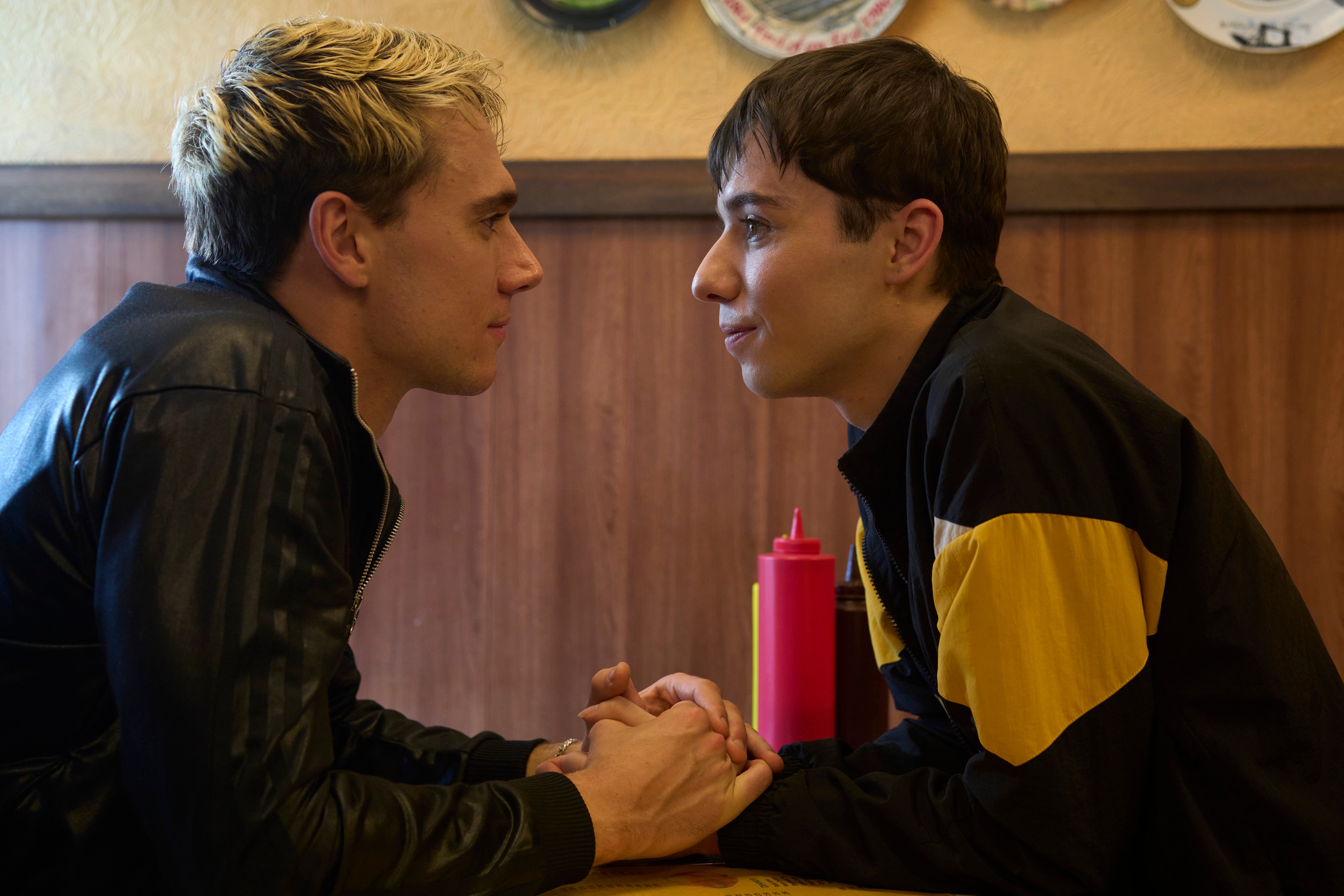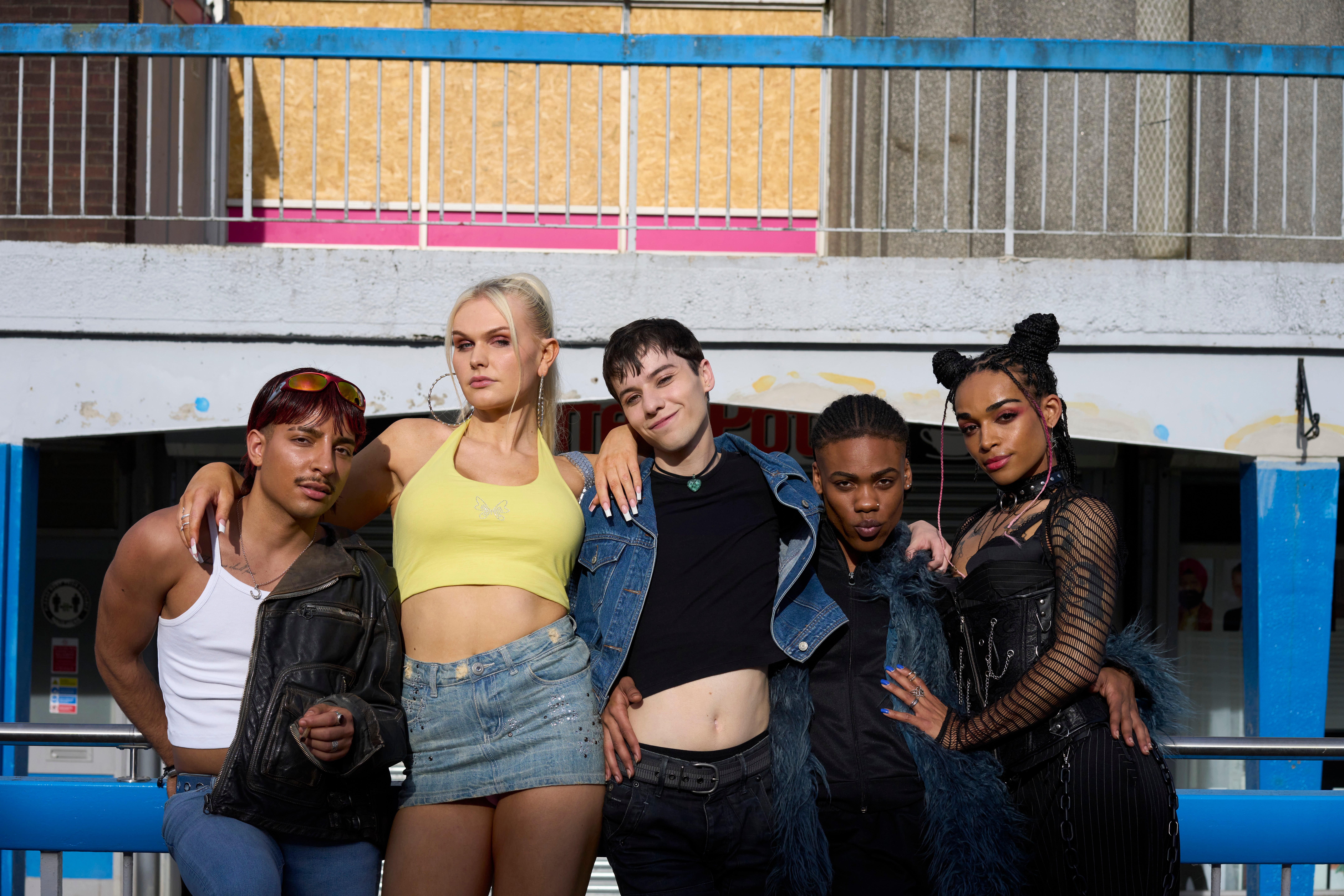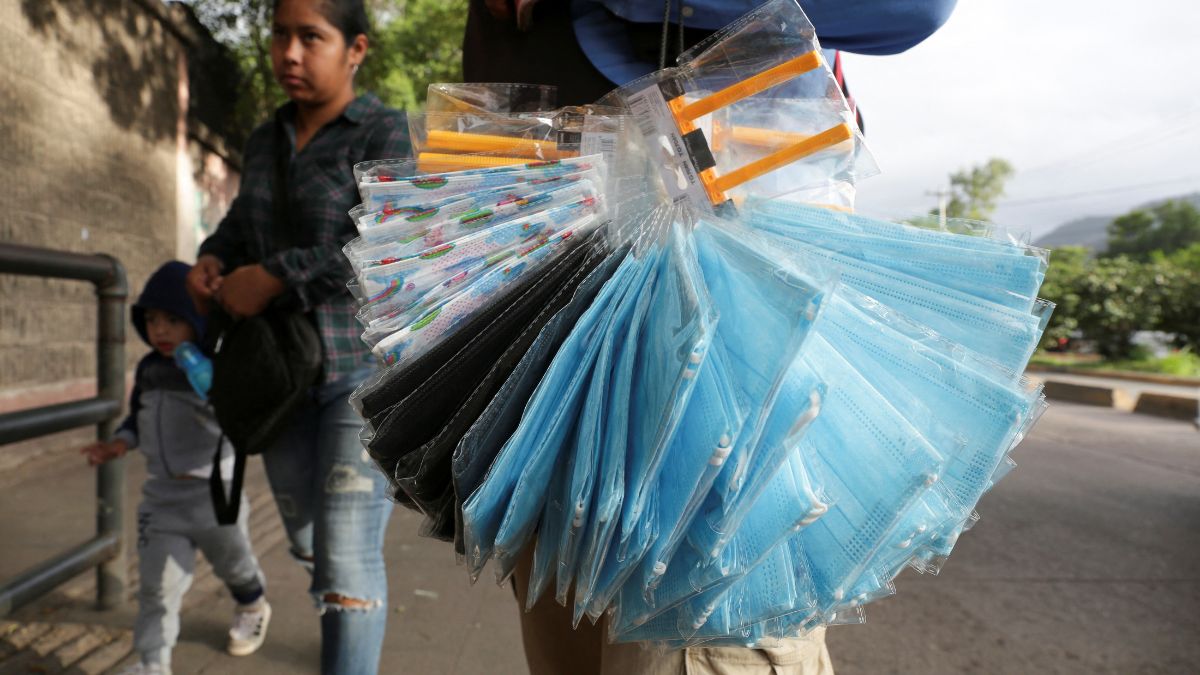Paris Lees – trans author and activist, now hit screenwriter – is reading to me her favourite response to her autobiographical BBC show, What It Feels Like for a Girl, from her iPhone. It wasn’t The Guardian calling it “deeply disturbing and totally fearless”. Or GQ opining that it is the “most interesting thing the BBC has made since I May Destroy You”. It was some man on X (Twitter) saying, “First time [I’ve] ever been able to watch slash put up with the antics of bent weird queens and strange MEN. Good program [sic], that. Never will get it, never want to, but the team behind that: well done.” Lees releases her phone from the clutch of her pearlescent acrylic nails, and says, “Honestly, to me, that is so much more authentic.”
That phone has been in the 38-year-old’s hand for the past few weeks as she’s been stunned, bowled over following the show’s success, even among some transphobes and the right-wing press. While it might be a surprise to Lees, it’s not to me: it’d be difficult to be unimpressed by the gritty and nuanced saga that sees a working-class teenage trans character Byron, based on Lees, go through more trials and tribulations than contestants on a series of Squid Game. “I’ve made a TV show that’s got 100 per cent on Rotten Tomatoes. Nobody is more shocked than me. I’m not saying it in an arrogant way, I cannot believe I did that. Could it actually be that I did it and it turned out well?” she says, almost shyly.
But because Lees is both darkly funny and disarmingly sincere, she adds with a chuckle, “Not bad for an old slag from Nottingham. You can quote me on that.” Then, because she’s had a past life as a journalist: “Not the headline though.”
Beyond sharing praise of the show on Instagram stories, it’s notable that Lees hasn’t done many interviews around the show’s release, when requests must be piling up with her team. The current climate for trans people after the UK Supreme Court’s harmful ruling on gender and biological sex could have played a part. But Lees says it’s more personal than that. “Believe it or not, I’m actually an introvert. I can do extroversion, I can put myself out there. I can get up on stage or go on television or whatever, but it really takes it out of me,” she says, referencing the aftermath of her first appearance on Question Time that had her on a mattress in the living room for three days to recover. “I’m just happy minding my business and leading my life and I’m not desperate to be turning up to things and posing and speaking to people.”
Any assumption that she must love an immediate captive audience likely stems from the fact that she’s almost comically charismatic. She glows through the laptop screen at me, wearing a simple outfit of a beige NY Yankees cap, gold hoops and a black tank vest. Her irrepressible personality is inextricable from her acerbic writing style, evident from her early days writing for VICE on such light subjects as prudishness in British feminism, enjoying sex unabashedly, and the unfiltered truth about being trans. Throughout the 2010s to the present day, her career has been a litany of firsts: she was the first trans cover star for Diva Magazine, the first trans columnist for Vogue and was the first trans presenter for Channel 4 and BBC Radio 1. Now she is the first British trans woman to create her own mainstream TV show.
She admits that she loved the validation of attention when she started out in this line of work. Now she finds our collective need for attention for attention’s sake – online and elsewhere – truly unhealthy. “I’m an addict, so I’m in recovery, which is the other thing. And I realised that one of my addictions was attention seeking. I was addicted to the high of attention. It could be bad attention. So when I say that I’ve gone off that, I mean profoundly. I think it’s really problematic.”

The internet, she believes, has made a lot of people deeply unwell in a way that we, as a society, haven’t identified and addressed. “We see it with the extremism, the misogyny, the transphobia, and I don’t want to be part of that. When I’m on my deathbed I’m not gonna look back and think, ‘God I was so hot when I was 30 and I got all of these likes on a photo’, but to feel that you’ve actually connected with people and that you’ve made people cry and feel something.” That’s why the attention from the show feels better and more enriching than anything she’s absorbed from the public or followers before. “It sounds pretentious, but it’s so much more meaningful. It’s like home-cooking when you’ve been eating fast food, you just can’t compare the two.”
That metaphor extends to the show itself, lest anyone suspect a standard queer coming-of-age tale isn’t for them. Over the course of eight nearly hour-long episodes, we watch Byron (played excellently by Ellis Howard) spiral (and cartwheel) through drugs and partying with an equally chaotic queer chosen family, becoming an underage rent boy, and getting involved in an armed robbery. At one point, there’s a particularly creative moment with a toilet brush. From scene to scene, it’s a sharp take on 2000s working-class hedonism, situated in Nottingham, where Lees grew up. The expected milestones – coming out to yourself, finding your people, telling your family – only appear as complex backdrops to the real narrative: a raw and unflinching pursuit of power by someone who grew up poor and feeling unlovable.
The show was adapted from Lees’ 2021 book of the same name. When the paperback version of the memoir-novel came out a year later, multiple major production companies approached her. She’d wanted to go on holiday and decompress from the pandemic and book promotion – but now she had a TV pilot to write, having never done screenwriting before. One key change Lees and the writing team made in adapting it for television was having Byron lie to their best friend Lady Di about being with the toxic love interest, Liam. It remains Lees’ only regret about the project. “Anybody who knows me and who’s followed my writing will know that actually I am honest,” she says. “It’s almost pathological. I talk about things that most people just wouldn’t and sometimes it comes across as bluntness or rudeness, but I do have this almost compulsive desire to tell the truth, even about the darkness within, which is something that I’ve tried to turn into a virtue with my writing.” She’s right when she says that readers didn’t believe that the life she wrote about for VICE actually happened to her: the bad feelings, the complicated situations.

Watch Apple TV+ free for 7 day
New subscribers only. £8.99/mo. after free trial. Plan auto-renews until cancelled.
Try for free
ADVERTISEMENT. If you sign up to this service we will earn commission. This revenue helps to fund journalism across The Independent.

Watch Apple TV+ free for 7 day
New subscribers only. £8.99/mo. after free trial. Plan auto-renews until cancelled.
Try for free
ADVERTISEMENT. If you sign up to this service we will earn commission. This revenue helps to fund journalism across The Independent.
“Why can’t we explore that in art?” she continues. “If it happens in reality, why can’t I talk about things that I’ve said and done and that have been said and done to me? You don’t have to like it, but it’s the reality.”
It occurred to me watching the show – but more so now seeing Lees speak with her actor likeness fresh in my mind – that Ellis Howard brings Lees to life with an uncanny accuracy. It’s something in the way her eyes dance, her mischievous smile, an unmistakable subversive cheekiness. “People that have known me for years, my own family, have been like, ‘Wow, Ellis has really got something of you,’” she smiles. “He did do a study of me because we’ve met and I think he was looking at videos [of me]. Originally we were looking for a trans person to play the role. So it’s been a bit weird when people go, ‘Yeah, the person who plays you, he’s really good. But I mean, the situation is what it is, isn’t it? I transitioned ultimately. And I feel pretty confident in who I am in 2025 that that doesn’t…” Her sentence slides away as she doesn’t want to get too bogged down in talk of transgender issues. “It wasn’t just a trans role, there were so many other qualities that the person needed to embody and I just felt like it was Ellis and he’s absolutely risen to the challenge.”

Since the show is so true to Lees’ life, it was imperative to her to have the support of the real people who inspired her characters. All of them had to sign consent forms, especially the two closest people to Lees. Her very good friend Steffi, who is transformed into Bryon’s closest confidante Lady Di, was brought into the writer’s room as a credited script consultant to help stoke Lees’ memories of their youth. “I’m conscious of the fact she’s a trans woman of colour,” Lees says. “I just couldn’t have done it without her blessing, because it’s my story but it’s our story.” Back when it was just in book form, Lees was ready to scrap it if she didn’t have Steffi’s approval. Thankfully her friend felt the same way: that people needed to know about the wild life they both lived. “Only we know what it felt like to be that kind of person at that moment in time, in that place, and it was hard, but we also had so much fun.”
Lees’ mother was a tougher sell. In reality and in the series – where she’s portrayed with equally intricate complexity by Laura Haddock – she left the young Lees behind temporarily to be raised by their intimidating, macho father and beloved grandmother. The tension between parent and child on screen feels painfully real. While the show was in production in 2024, Lees says her mother had a wobble, knowing what was to come. “She’s a very private woman. She doesn’t even have social media. And I think she regrets that period of her life and how she handled certain things. Who’s not going to freak out and be like, ‘Oh my God, this thing’s happening.’?” Now she’s the show’s biggest fan, and Lees had the satisfaction of watching it with her and her stepfather. “I think she’s very proud of me and she feels that [my story] needs to be told, basically.”
That its audience has far transcended that of a sympathetic queer one, is testament to how much bigger it is than a trans story. “How many people didn’t feel safe growing up?” asks Lees, gesturing to the heart of the show. “There’s this great quote and I don’t recall who said it, that people who don’t feel safe in their homes growing up as children – and that can be neglect, it can be violence, it can be sexual, for whatever reason – struggle to feel safe anywhere as an adult. And that’s been a huge thing for me. I didn’t feel secure in my attachments growing up. I didn’t feel secure going to school. I didn’t necessarily feel secure at home. How many people grew up feeling like that and are dealing with it 10, 20, 30 years later? That stuff is…” she says, considering her words, looking off camera. “I don’t want to say you can’t overcome it, but that stuff really does set you on course for the rest of your life.”

The show took serious personal excavation – that she won’t do again on her next scriptwriting project or her future books, all of which are slowly in the works – but it was worth it. The delight, relief and shock are emanating from Lees. “People go, ‘it’s really good’, and it’s like well, good – because I don’t have a husband, I don’t have a business, I don’t have kids, could do the whole life milestones… I put all of my eggs in this basket, this is what I’ve got to show for my life, so it better be bloody good. So I’m really happy that it’s had a good reaction, because otherwise I don’t know what I’d do with myself, really.”
The last time I interviewed Lees for a feature about transphobia in the British media in 2020, she was in Europe and planned to leave the UK long term. The endless debating of trans rights was harming her peace. “I am one of the most privileged trans people in the country. So if I’m feeling like this, I can tell you a lot of other trans people are feeling like this,” she shared with me at that time. Today she’s sitting in a dining area somewhere in the UK, though she continues to split her time between here and Europe. She still feels despondent about the state of our country but the wonderful response to What It Feels Like for a Girl – the sorts of everyday ones like the one the random man on X offered up – have given her a sense of promise.
“I could have been written off, and I could’ve ended up killing myself or having an overdose as a teenager, [like] so many people who fall through the cracks but I didn’t,” she says to conclude. “Even when it feels like there’s no hope, life is not set in stone. We don’t have to continue down the route we’re going – we don’t have to do it as individuals, we don’t have to do it as a country. I feel like I’ve rediscovered hope.”
‘What It Feels Like for a Girl’ is available on BBC iPlayer now



)